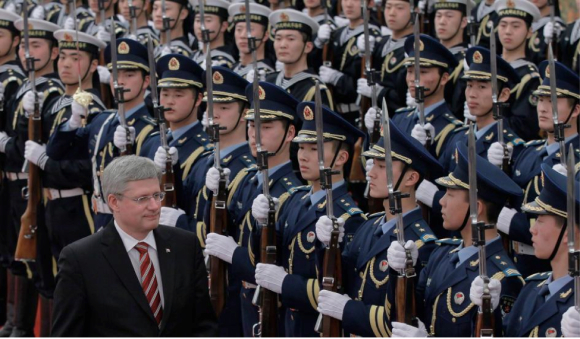Treaties of the New Millennium: Two Steps Forward, One Giant Step Back

This fall, three treaties were signed spanning massive geographic areas. The treaties exhibit diametrically opposed views of the direction of our societies and economies. Some may say that one view brings the economy and countries forward, the other backwards; but I have a feeling that not all are equal for the continent. And I think it’s time that Canada take some advice from Indigenous peoples.
The Northern Tribes Buffalo Treaty was signed between eleven first nations, crossing an international border in the northern plains. The second treaty, between Canada and China, is essentially the Canadian version of the Trans-Pacific Trade Agreement. A third treaty regarding the protection of the Salish Sea includes nine First Nations also straddling the U.S.-Canada border.
Signed September 23, the Buffalo treaty encompasses 6.3 million acres of land held by the Blackfeet Nation ( in the US and Canada), Blood Tribe, Siksika Nation, Piikani Nation, Assiniboine and Gros Ventre Tribes of Fort Belknap Reservation, the Assiniboine and Sioux Tribes of Fort Peck Reservation, the Confederated Salish and Kootenai Tribes, and the Tsuu T’ina Nation. Those first nations are largely in the Montana and Alberta region. These nations have come together to restore the buffalo, or “ iiniwaa” the Blackfeet word, to its natural territory.
Leroy Littlebear, Blackfoot scholar at the University of Lethbridge explains, “Tribes and First Nations in Canada and the United States own and manage a vast amount of intact prairie habitat across the Great Plains and mountain foothills…. These intact grasslands provide suitable habitat for … buffalo if they remain intact, un-fragmented and in their natural state. Native peoples of the northern Great Plains are culturally disposed to protecting their homelands, connecting with free-roaming buffalo, and have expressed considerable interest in their repatriation to native landscapes.” Littlebear explains, “ Individually, each tribe may have limited resources and influence to achieve this grand vision of buffalo restoration. However, our combined voice and expressed political unity will help us achieve broader support for ecological restoration and the enrichment of tribal cultures.” The tribes are calling on federal, state and private parties to support the restoration of the buffalo, Littlebear said in a formal announcement.
In contrast, Canadian Premier Stephen Harper ratified an “Agreement Between the Government of Canada and the Government of the People's Republic of China for the Promotion and Reciprocal Protection of Investments” (known as “FIPPA” or the “Canadian/Chinese Treaty”). The Treaty went into effect on October 1 and will last for 31 years, until 2045. According to Canadian Newsweek, the Treaty, “allows China to challenge Canadian laws it deems harmful to Chinese assets, and only requires the lawsuit be made public once an award is issued by a tribunal.” Treaty law expert Gus Van Harten warns this could be problematic. “The (Canadian/Chinese) Treaty makes no limits on the damages that can be awarded”.
The Hupacasath First Nation filed an action in federal court last year seeking to enjoin the Canadian/Chinese Treaty, to no avail, but illustrating the concern.
Brenda Sayers, a Hupacasath representative, explained that a logging company with Chinese investors could sue Canada for damages if the band stopped the company from cutting timber on its traditional territory. And she said if First Nations in northern British Columbia put up a blockade to the proposed Enbridge pipeline, that could open Canada to lawsuits by Chinese investors in Alberta’s oil sand. “I want people to know how important this [issue] is. It will affect our children. Please spread the word about Canada-China FIPPA. It has to become a household word.”
The Canadian/Chinese treaty also threatens treaty obligations between Canada and First Nations. “Paired with the terms allowing Chinese entities to buy anything they wish without foreign investment review, China will have access to and potentially be able to gain control of Canadian resources—including resources on First Nations’ lands, which Canada does not own.” Newsweek Canada reported.

The Chinese/Canadian treaty allows China to sue Canada in secret tribunals for Canadian laws that interfere with Chinese investments. Those are substantial. Chinese companies have a hefty $30 billion invested into the Canadian tar sands and even more into mining industries in the Ring of Fire, with similar interests growing in the US. Canadian investment in all sectors of the Chinese economy totaled $4.2 billion in 2012. In short, it’s not exactly an equal interest.
We’ll see how it all pans out, but Canadian investors are considering the agreement incredibly one-sided for China. And I just want to point out that China has the third largest military in the world, and Canada has no military to speak of. If things go poorly. Native people have a lot of experience with this.
In comparison, the Buffalo Treaty is the third intertribal treaty of its kind in 150 years . The first, two years ago at Yankton Dakota Reservation, was a treaty signed between Lakota , Cheyenne, Ponca , Dakota and other nations to protect water. The Salish Sea treaty was signed in September as well.
The North American buffalo herd was once the largest migratory herd in the world, surpassing the African wildebeest herds in size. The large herds bio-engineered the prairie, and were able to support themselves through harsh winters without any fossil fuel inputs, unlike present day cattle. (To wit, last September’s freak blizzard killed 100,000 cattle in South Dakota, but not a single buffalo was reported lost.) In short, the Buffalo Treaty may have some promise for future generations.
Just as a history lesson, Native Nations have signed over 370 treaties with foreign countries, and most of those have not worked out too well for us—particularly the ones signed with aggressive military powers and huge economic interests.
Canada, you might learn a thing or two from this history.

Winona LaDuke is the Executive Director of Honor the Earth in White Earth Reservation, Minnesota. Visit their website at HonorEarth.org.
Read more at http://indiancountrytodaymedianetwork.com/2014/10/28/treaties-new-millennium-two-steps-forward-one-giant-step-back-157561